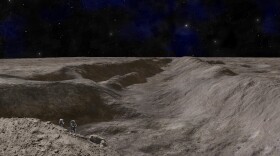-
American culture was obsessed with Martians in the early 1900s. In a new book, bestselling author David Baron explains how this “alien craze” started with one astronomer in Flagstaff.
-
A new study explains how two deep canyons formed very quickly on the moon during an asteroid impact. KNAU’s Melissa Sevigny spoke with local planetary scientist David Kring about the findings.
-
A University of Arizona-led spacecraft mission will drop a capsule at supersonic speeds into Earth’s atmosphere for a landing in the Utah desert. The capsule carries a sample of asteroid rubble that contains clues to the origins of the solar system.
-
The epic geology of the Grand Canyon was the perfect training ground for Apollo astronauts half a century ago. Now, a researcher is trying to retrace their steps. KNAU’s Melissa Sevigny spoke with Kevin Schindler, historian of Lowell Observatory and the Grand Canyon’s current astronomer in residence.
-
Arizona Senator Mark Kelly has been inducted into the Astronaut Hall of Fame as part of its 24th class.
-
Sunset Crater Volcano National Monument celebrated its listing in the National Register of Historic Places on Saturday. KNAU’s Melissa Sevigny reports, the designation recognizes Sunset Crater’s vital role in the Apollo missions to the moon.
-
This Saturday is Earth Day, a celebration begun in the United States in 1970 at the cusp of the modern environmental movement and now recognized by millions around the world. But very few people have the chance to actually see the Earth in its entirety. One of those people is retired NASA astronaut Nicole Stott. KNAU’s Melissa Sevigny spoke with her earlier this year about the perspective of Earth that’s only possible from space.
-
The ORBITS Act is aimed at improving national security, communications reliability, and protecting astronauts and satellites.
-
NASA’s Artemis program intends to return humans to the moon after a half-century hiatus. But first, astronauts and engineers have to train and test lifesaving equipment here on Earth. So they’re returning to the same places where Apollo astronauts used to practice fifty years ago—the moonlike lava fields of Northern Arizona. KNAU’s Melissa Sevigny reports.
-
The first Native American woman in space says she's overwhelmed by the beauty and delicacy of Mother Earth.

Play Live Radio
Next Up:
0:00
0:00
Available On Air Stations










